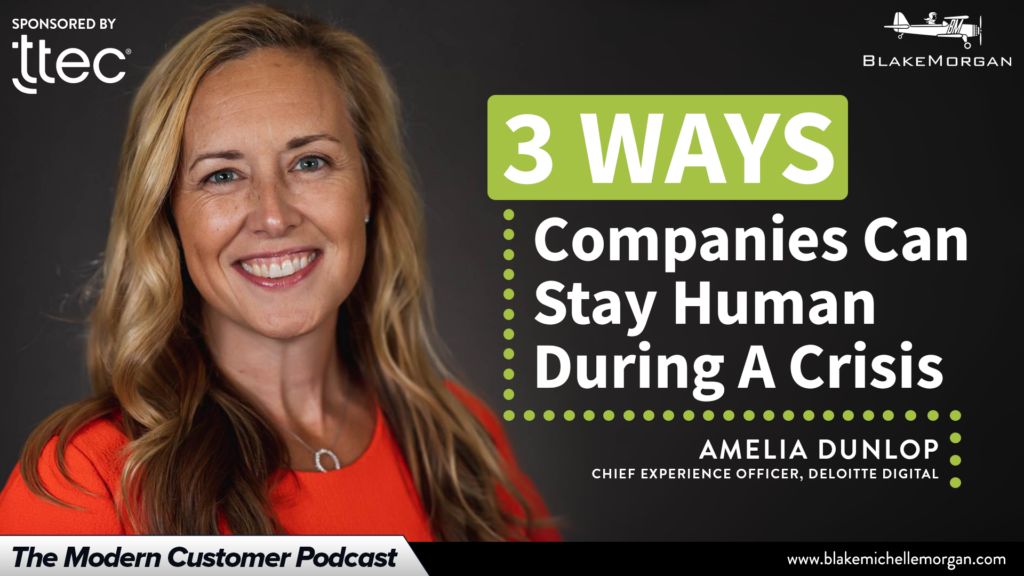No one could have ever predicted what would happen in 2020. Aside from the pandemic and its impact on the global economy, unemployment, remote learning and a host of other issues, there are also widespread cries to end systemic racism, fires and natural disasters and a tumultuous presidential election. It’s more than anyone could ever have imagined, and it’s taking a toll on consumers.
But even with these unique conditions, companies are moving forward and working to grow and provide great service to customers. The question many companies face is how to connect with customers when so much about the world has changed and people are facing so much stress.
Amelia Dunlop, Chief Experience Officer at Deloitte Digital, refers to it as the emotional toll COVID-19 has taken on people. No matter how it affects each person, the pandemic and other crises have caused stress and exhaustion and changed people.
Deloitte Digital set out to get a pulse on how customer behavior is changing amidst all of the chaos. A survey of 28,000 Americans introduced numerous stories about the changing human experience and showcased what Americans are going through, where they need help and what companies can do to stay relevant. It comes down to one key area: be human. Consumers want companies that are empathetic and see them as individuals in the middle of a crisis, not just shoppers who are the same as they were six months ago.
Deloitte Digital’s results found three ways companies can become more human during a crisis:
- Build trust. Companies have to balance the natural tension between the safety of the group with each individual customer’s freedom in a way that builds trust with customers and is open and authentic.
- Signal safety. Customers are concerned about safety and often don’t know who to trust. Companies need to create a comprehensive safety plan and clearly communicate it to customers. People look for safety signs that they can see, feel, hear and smell.
- Redefine connection. Companies must change their approach to physical and virtual interactions to meet the human need to connect while still being safe. Customers still want connection, even if it comes in a different form.
Being human requires companies to understand their customers and especially how they are reacting to challenges of the current crisis. The Deloitte Survey also found that people fit into three different clusters:
- Protectors: These are the people who are more concerned about health risks and tend to only trust themselves or their immediate family in regards to safety. They feel anxious and are acting with concern.
- Prevailers: This group is skeptical about how long the crisis will last. They are optimistic about reopening the economy and are likely to be the first for in-person experiences. Prevailers feel skeptical and are acting with confidence.
- Pragmatists: This group falls in between the others and tries to balance health and safety with a push to return to normal. People who fall into this category are feeling calm and acting with balance.
Although everyone is going through the same crises, Dunlop says each person values different things. For companies to stay relevant and stay human, they have to build empathy and softer experiences for stressed consumers.
Crises will always be part of doing business, even when they are as unpredictable as 2020 has shown. Keeping a good understanding of customers and staying human can help companies navigate crises and maintain strong relationships.
This week’s podcast is sponsored by TTEC.
Imagine an interaction that’s so simple and easy, that you don’t even think about it!
TTEC calls this ‘mastering the effortless experience’… and it’s the future of CX.
When your competition is just a click away, how do you ensure your customers stay loyal? How do you keep your employees engaged and motivated? How do you make sure your brand thrives?
Managing over 3.5 million interactions daily, TTEC are CX experts who know what it takes to deliver amazing and effortless customer experiences. They combine CX strategy with proven-processes, award-winning people engagement and best-of-breed technology to deliver holistic solutions focused on driving real-world results for their clients every day.
Don’t get lost in a sea of competitors. Effortless is not a destination. It’s a journey. And TTEC can be your guide to an effortless future.
To find out more about how TTEC can help you transform your customer experience visit TTECDigital.com.
Blake Morgan is a customer experience futurist, keynote speaker and the author of the bestselling book The Customer Of The Future. Sign up for her weekly newsletter here.

